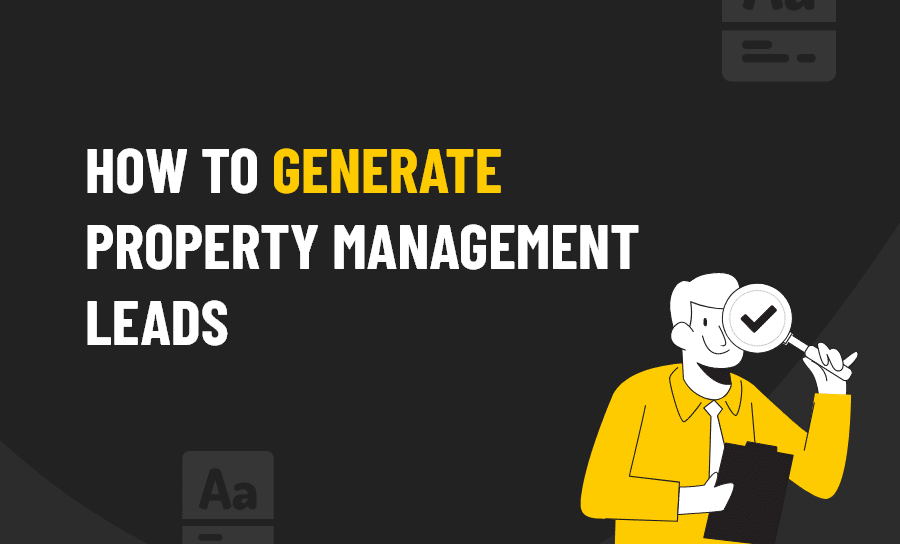You’re not alone if you’ve seen changes in the property management industry that are impacting your property owner clients and property management portfolio. Property management business owners have it tough out there at any time, but that is especially true recently.
In a seller’s market, a property management company’s prospective clients (namely, Accidental Landlords) are selling their portfolios at breakneck speed, necessitating a constant need to recruit new rental owner clients that they may never have had to worry too much about before. Which means working harder on discovering just how to generate property management leads and more of them.
But what are your options? You must seek out new owner clients to pitch your services to, but doing so isn’t always as simple as it appears, especially in a time when everyone is trying to avoid traditional advertisements because their trust in them is at an all-time low.
Property management lead generation can be a lever you can pull when you need it, whether your goal is to develop your firm quickly or maintain the size of your portfolio. After all, acquiring new (and, frankly, more valued) clients is at the top of everyone’s priority list.
Still, in order to put effective lead generation for property management plans in place, you should have a fundamental understanding of how to get the most bang for your buck through the many lead generation channels accessible to the average business owner (as well as when to ask for help from lead generation professionals.)
In this piece, we’ll go over the three basic stages of a lead in the marketing funnel, as well as the top sources for property owner leads and some practical, cost-effective techniques to use.
The Marketing Funnel (And Where We'll Concentrate Our Attention)
For those who aren’t familiar with it, a marketing funnel is a conceptual structure used to follow a lead from the moment a potential client learns about your business and brand to when you gather their contact information to when they become a customer, for those who aren’t familiar with it.
- The top of the funnel focuses on raising awareness and subsequently acquiring leads who are often unfamiliar with your company and, in this case, the property management services you offer.
- The goal of the middle of the funnel is to get the lead to a point where they’re analyzing their needs and beginning to realize how your services can help.
- The bottom of the funnel is where those leads compare your property management services to those of your competitors, possibly with a proposal in hand.
Because there isn’t a limitless marketing budget to nurture a lead through the complete funnel, it’s usually better for property management organizations with restricted funds to focus on leads who are currently in the middle of the funnel and exhibiting signals that they are analyzing their needs.
These prospective clients are, by definition, further along in the decision-making process and have begun to see property management as a viable option. In our business, they are known as warm leads.
Sidenote: Although it isn’t the focus of this post, knowing your ideal owner profile is critical; otherwise, your marketing and lead generation efforts could be targeting and attracting the wrong leads.
To get started, let’s go over the most common sources of property management leads before we get into actionable tactics for locating them.
Property Managers' Lead Generation Sources
To get a better idea of what you can achieve with a focused lead generation for property management campaign, you’ll need to know about the different types of lead sources that can bring in new rental owner clients. The most popular alternatives are listed below.
Your Website
Consider what a property management website with a distinct, recognisable brand would look like if you don’t already have one. And then work on making it so. And even if you feel that you do, there are a slew of modifications you can make with help of bespoke software developers to your site to make it easier to collect people’s contact information.
Targeted Content Marketing
Most small business owners won’t have the money or time to maintain a strong content programme that includes regular blog entries, guides, white papers, videos, and podcast episodes, and that’s sometimes a problem.
Usually if property owners are trawling the Internet for advice on property management looking for someone to pay to do so is not their first thought. They are often looking for advice on how they can do it themselves. If you can create that content – that then subtly points out why doing so is not a good idea – the reader is likely to already have developed some trust in you – which is hugely important of course.
So, if you don’t have the time to create such content – or even know how – working with content specialists who are also lead gen specialists (like those we have on the Pearl Lemon Leads team) can be a great investment.
Property Management Lead Generation and Social Media
Regardless of your marketing and lead generation budget, Facebook, Linkedin, and Instagram are playing an increasingly essential role in your lead generation strategy in an unexpected way that is driven by your potential property owner clients’ residents (more on this later).
Property Management Lead Generation and Review Sites
Consumers have swiftly come to rely on sites like Yelp, Trustpilot, Angie’s List, and Google My Business to vet property management services and leave their own ratings. Even if they wish they could, no property management company can afford to turn a blind eye to them.
Business Events in Your Community
These are events in your local real estate community where you can meet other business owners and demonstrate your knowledge in order to attract new clients. Not all of them are a great use of your time in terms of property management lead generation, but some of them might be.
Search Engine Marketing (SEM)
The opportunity to experiment with paid search acquisition for certain small businesses is more feasible than you might expect. Paid Search on Google and Bing allows you to bid on terms that your potential customers are searching for.
Still with us? Great. Now let’s get to the good part, now that we have a rough idea of the marketing funnel and the outlets you can use to attract additional property owner clients. The following are some practical ways for generating property management leads that will work – when done right – for property management businesses of all sizes.
Make Your Website More User-friendly
First and foremost, there are a few fundamentals that you should adhere to when creating your website: Your website should reflect your brand and explain your unique value proposition to your target audience of property owners looking for property management help.
This necessitates well-written, SEO optimized copy listing your services, accompanied by a solid design that appropriately implements the technological SEO parts across your site.
Sitemaps, 404 site issues, and poor page load times can all affect your Google ranking. Many free tools, such as SEM Rush’s Site Audit, are available to assist you in identifying any flaws your site may have, although a professional’s opinion is almost always more helpful (and accurate.)
You want to make sure you’re optimizing for the keywords that apply to your business, and then offering potential clients material that addresses any pain areas you can alleviate.
Have you noticed how many chatbots are popping up on websites lately? These can be useful automated tools for quickly qualifying leads for a call with you. These are well worth investigating to enable your site to capture an email address, as well as other valuable information such as services required, property type, and property number.
What’s the best course of action for you?
Create a strong website from both a marketing and technical standpoint. Make sure your website is organized around what is most important for potential customers to learn. Also, do some keyword research and think about new technologies like chatbots. Use content carefully and only when it can help your potential clients with a problem that you can address.
Be Socially Aware, But Not Too Social
For many small business owners, social media has become a difficult arena to navigate. Some marketers may advise you to jump right in, but this isn’t the best advice.
Every social media network nowadays will try to get you to advertise—and it’s difficult to target the ideal audience when it comes to property management. Even with a large budget, and especially on a premium site like LinkedIn, where the average cost per lead maybe $75, finding the right potential property management clients will be difficult.
That’s not to say you should ignore social media: It’s the polar opposite. As a business owner, you should publish on social media as much as you can afford to, both in terms of time and money, while keeping your expectations in check.
What’s the best course of action for you?
Your company can be blasted on social media and review sites for allegedly poor service—even if it isn’t your fault. The major point is that peeved residents will complain about your business, while potential clients will look at what they write and your comments with voyeuristic interest.
As a result, your best course of action is to keep up a social presence on major sites, develop positivism, and reply to any unpleasant comments fairly and promptly.
Allowing social media or poor reviews to be a detractor is not a good idea. You may also provide ongoing value to your audience by selecting and distributing other relevant information that you have a unique take on—aim to do this around half of the time.
Use Caution When Using Paid Search
“Well, why paid search and not paid social?” you might wonder. The fact is that Google Ads allows you to target your audience more precisely, and you have a better chance of attracting the correct people when you can narrow down your audience.
The essential differentiation is to find ways to condense your unique value prop through your ad language. You have well over a hundred characters to make a good first impression. Think long and hard about this, and be inventive, because it has the potential to make a significant difference. Another reason why, if you are going to go this route, you should probably work with a PPC savvy lead generation expert.
However, the price depends on your region and the terms you’re bidding on. For example, if you’re in a smaller area, you could be able to test out this channel for as little as $500 per month. To test a campaign in a heavily populated city, expect to spend between $2,000 and $3,000. And if you decide to do paid search, you should test it for at least 30-60 days so you can learn, evaluate what’s working, and adapt your approach.
You’ll want to assess your landing page experience before hitting play on any paid ad, in addition to nailing your value proposition, which assumes you have a good sense of your brand.
What exactly does that mean? Consider the web experience from the standpoint of a potential client: First and foremost, how does the copy and visuals relate to the ad copy you’re using?
Second, does the landing page load quickly and function well on both a desktop and mobile browser? You’ll make a negative first impression and waste your money if it doesn’t.
What’s the best course of action for you?
If you decide to conduct a PPC lead generation campaign for at least 1-2 months, use tight language that emphasizes the core value your company provides, but also make sure the landing page is responsive.
Most importantly, avoid bidding on keywords that are excessively competitive—which is always tempting. It’s best to be as detailed as possible with the keywords you use in the areas where you do business.
In Person, Become a Subject-Matter Expert
When it comes down to it, seminars and speaking events are one of the best (but often most expensive) ways to get new leads. You can “show up” by attending local events and networking with other real estate professionals who service investors or your most lucrative ideal clients.
Consider the most important players in your industry and how you can engage with them when it’s genuinely worthwhile. And ensure that what you do say, and you do present, is entertaining/factual/persuasive, and not just a load of fluff that will do nothing to enhance your professional reputation and that of your property management business (which is a mistake that’s all too easy to make.)
What’s the best course of action for you?
Only go to events that have a proven track record, and make an effort to stand out from the crowd. Take advantage of any opportunities to promote your company and show them what you’re all about. Consider hosting your own event or mixer if you notice a community of investors and other real estate professionals that isn’t being served.
How to Generate More Property Management Leads?
When it comes down to it, it's all about this
No matter which technique you choose, getting property management leads is difficult. We know you’ve heard it before, but while we advocate a variety of channels for the average property management company, there is no silver bullet.
The one thing we do know is that without a stream of property management leads, your business won’t thrive. And we’re pretty sure you know that too, or you wouldn’t be here reading a long article about how to generate property management leads.
We also know that all of this probably sounds complex and very time-consuming. Which, perhaps, is again something you already knew, and came here looking for great ways to save time on property management lead generation.
On the latter, working with a lead generation company that can do most of the heavy lifting for you is often the best, and believe it or not, cost-effective way to generate more property management leads.
Cost-effective, really? We know, paying someone else to generate leads for you can be something you haven’t, or didn’t want, to consider. But think of it this way.
You need property management leads. Those leads are getting harder and harder to come by. The effort you’ll have to put into lead generation will require more knowledge and more time.
Time that you should probably be devoting to serving the clients you have, and doing the day-to-day property management ‘stuff’ that pays the bills. And also to closing the leads, if any, you do manage to generate.
Now put a monetary figure on that time, and the chances are you’ll discover that working with a property management lead generation company is probably cheaper. Especially if the leads they generate are better leads, people are more likely to be receptive to what you have to offer.
At the very least, when working through your how to generate more property management leads, talk to a professional, like a member of the Pearl Lemon Leads team, to see what they could do for you.
property management leads faqs
Digital marketing is probably the most powerful tool to find property management leads for your business. Digital marketing is great for property management leads because the Internet is where your customers will be comparing prices, service offerings, and other aspects of your business to your competitors. If you want to be on the short list of property management companies for your clients, you’ll have to gain a foothold in the digital landscape.
Here’s where to begin with your digital marketing strategy:
- A stand-out website – A professional-looking, helpful, and well-designed website with helpful insights into your distinct brand will go a long way towards showing clients you’re a worthy property manager.
- Targeted content marketing – Make content that not only highlights your business’s unique offerings or special deals but also content that gives information about how your clients might manage the property themselves. It might seem counterintuitive to do this, but it will establish your brand as an authority with your clients and help you with lead generation.
Search Engine Marketing – Advertising on popular search platforms like Google will ensure that your brand and business name are always at the top of the list while customers and clients are looking for property managers to hire.
If you’re trying to bring new clients to your properties, you will first need to carve out a specific real estate niche for your brand to serve. A niche means fewer real estate customers, of course, but you have a better chance of landing with the customers you’re serving since you’re looking out directly for their needs. Develop a real estate niche that works with the unique brand you’ve set out to create and one that’s based on the property you already own. An excellent way to develop your real estate niche is by deciding whether you want to manage commercial or residential properties. From there, you can set the specific subgroup of real estate properties you want to manage, such as single-family homes, mall stores, or luxury apartments.
If you’re a property manager hoping to get new clients, digital marketing is a great place to start your business.
To get clients, you’re going to want to follow this simple digital marketing roadmap:
- Update your content. Update everything constantly, from your website to your social media page to your review site responses, to generate qualified leads for your business. Showing that you’re keeping up to date on your content is a great way to signal to customers that you care about cultivating your brand and content.
- Build a network. Social media (especially professional social media like LinkedIn) will go a long way toward helping you establish your brand and build relationships with significant real estate agents, property owners, and other clients within your industry.
Property managers typically get paid a monthly commission equivalent to about 10% of what the property owner collects. This can vary, though, depending on how much work needs to be done on the property and the current rental status of the property. For example, a property manager might only charge a fixed fee or a percentage of the expected monthly rent for the property that a landlord isn’t currently leasing to a tenant.






